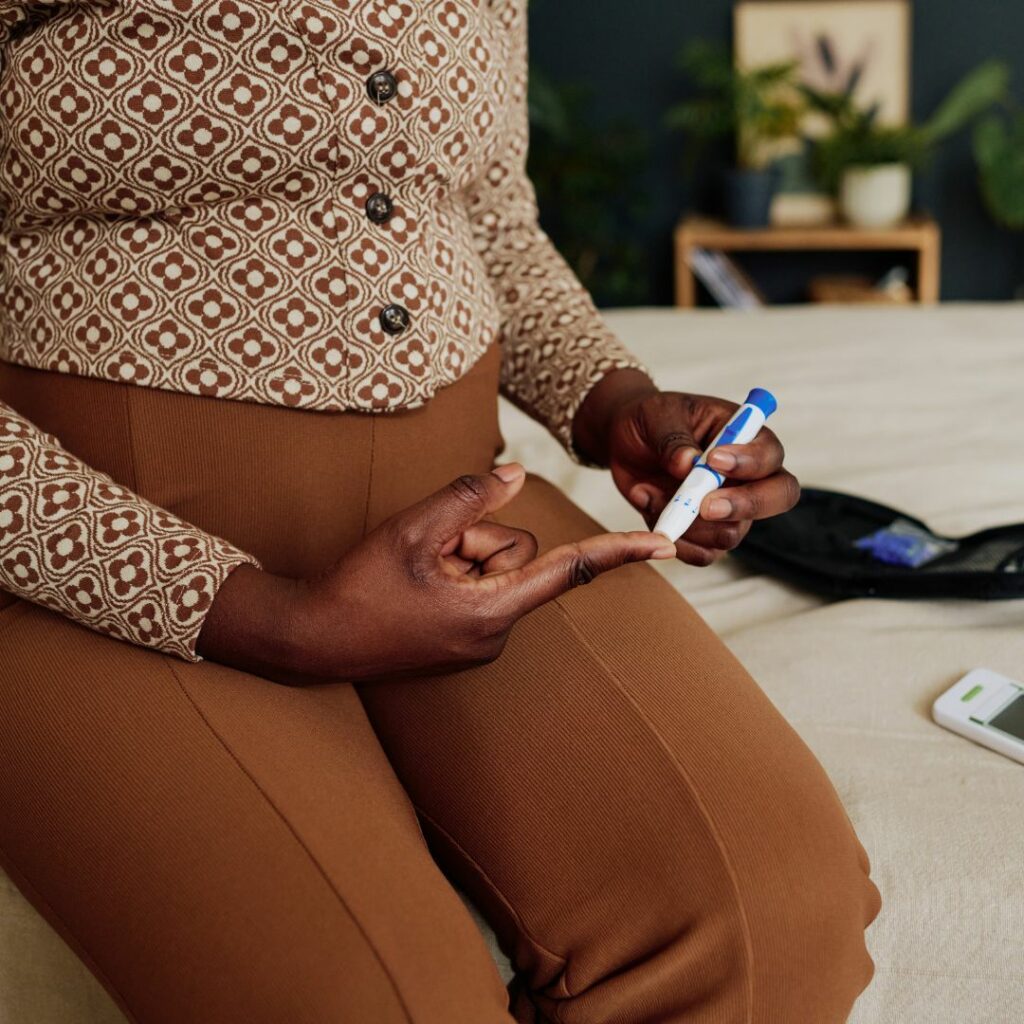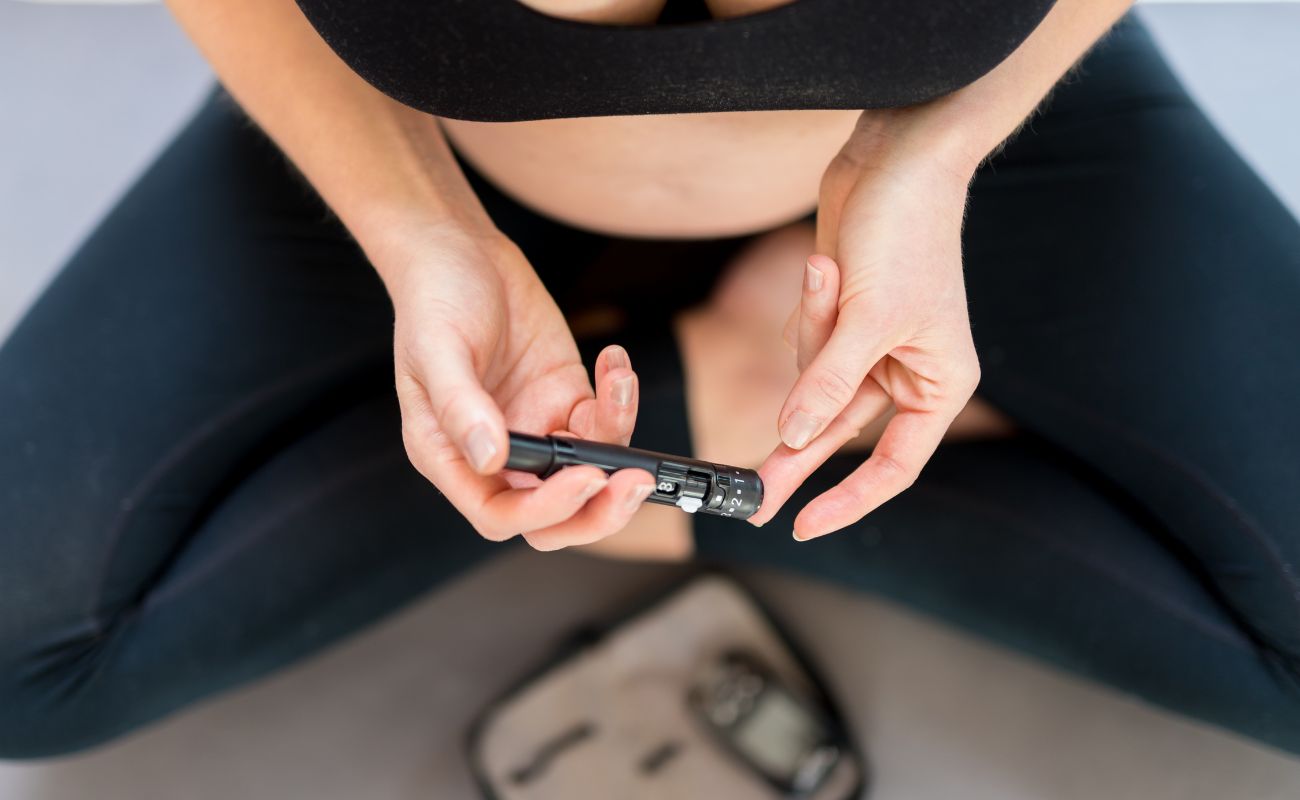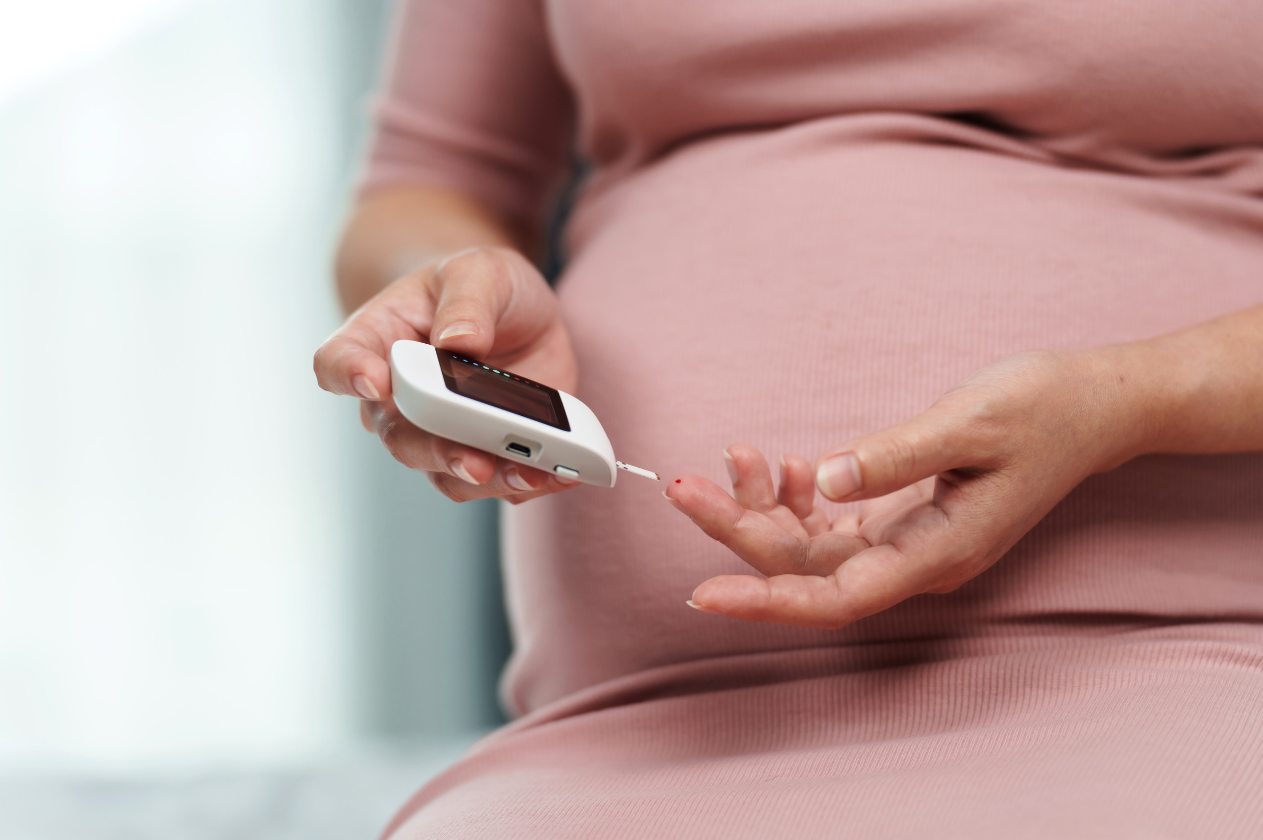Fasting blood sugar levels during pregnancy are an important aspect of monitoring your health and the well-being of your developing baby, especially if you have gestational diabetes or are higher-risk. If your doctor has told you to monitor your blood sugars, you may be feeling a little lost and even overwhelmed with where to begin.
Should you cut out carbs? Take up running? Only eat protein? You wish you had a blueprint to guide you through this process as you work to become more confident in your gestational diabetes management. Well, look no further. As a gestational diabetes dietitian and certified intuitive eating counselor, I’m here to give you the 411 on all things fasting blood sugar. Grab a pen and let’s get into it.
Table of Contents
Benefits of lower fasting blood sugars in pregnancy
Before we can get into how to lower your fasting blood sugars, it’s important to note why this matters for your pregnancy. Research from the HAPO study (Hyperglycemia and Adverse Pregnancy Outcomes study that we’ll talk about more below) has shown that pregnant folks whose fasting numbers were in-range more often had fewer adverse health outcomes, even if they didn’t have gestational diabetes.
The research also showed that:
- The chances of having a big baby was 10% if fasting blood sugar was maintained at 90 mg on average
- Chances of having a big baby rose to 17% if your average fasting blood sugar was closer to 95 mg
- If you average fasting blood sugar is 100 mg, you have a 30-35% change of having a larger baby
While there is nothing “wrong” with having a bigger baby, it can increase your chance of complications and may impede your ability to give birth vaginally. Interested in learning more about the research behind fasting blood sugar and pregnancy outcomes (and how intuitive eating ties into all of this)? Click here to read more.
How to check your fasting blood sugars

Before we can really dive in to tips for lowering your fasting blood sugars, here are a few tips to keep in mind when it comes to how to check your numbers:
- Check your blood sugar FIRST thing in the morning when you wake up. You want to do it before you get out of bed and before you get your day going.
- Leave your testing supplies on your bedside table to make it easy in the morning!
- Aim for about 8-9 hours of fasting (typically these will be the hours you’re asleep). We’ll touch more on how to hit this fasting window when we talk about bedtime snacks below.
- If you like to sleep more than 8-9 hours you can also try setting an alarm to remind you to test blood sugars then go back to sleep!
- If your fasting numbers are “high” (we’ll talk more about what this means below) you can also try testing in the middle of the night if you wake up to use the bathroom. For some people their blood sugar dips low and then rebounds giving you a higher number in the morning. For others it might stay high after dinner or your snack (if that is the case we can try changing something with dinner and bedtime snack so you can go to bed with a lower blood sugar that will stay stable through the night).
- Make sure your hands are clean when you test. If you put on lotion frequently or eat a snack before bed, it can be helpful to make sure your hands are washed and dried.
Remember to take some time and find a good testing strategy and routine that works for you!
Fasting blood sugar numbers to keep in mind
As we start to discuss actual blood sugar numbers and “goals”, I want you to keep in mind that these numbers do not determine your worth or value. They also don’t determine how much you care about your pregnancy or baby. They are simply a unit of measure that can be used to determine what your body and baby needs. I always encourage my clients to approach these numbers with curiosity, not judgment.
- They’re in range? Great! What did we do that could maybe be repeated?
- They’re not in range? Is there a tweak or change we can make to see if we can get them where we want them?
It’s all a learning experience! Now, let’s talk about some important numbers to keep in mind.
Typically your provider will suggest a fasting blood sugar goal of below 90 or 95. These numbers are sourced from a large study (the Hyperglycemia and Adverse Pregnancy Outcomes or HAPO study). This study shows us that the pregnant person’s blood sugar levels are correlated with the baby’s health outcomes. Essentially, the research showed that as blood sugars in pregnancy increased, the adverse outcomes of pregnancy also increased.
The reason the recommendation sits at less than 90 or 95 is because we see the biggest decrease in adverse outcomes in pregnancy at this number. If you don’t have gestational diabetes, your blood sugar is usually in the 70s or 80s.
If you haven’t yet been tested for gestational diabetes and are wondering what to expect, this blog could be a great resource for you. We talk more about what happens at the test and how you can best prepare.
Factors that may influence your fasting blood sugar
Beyond baby’s health and reducing complications, fasting blood sugars are important because they give us insight into what’s going on in your body metabolically. Fasting numbers are determined by so many factors beyond just what you eat, which is why it’s important to remember it’s not always going to be something that’s within your control.
Let’s look at a few other factors that can influence your fasting numbers beyond just what you eat:
- Sleep
- Stress
- Muscle activity
- Movement
- Genetics
- Hormones
Of course working on nutrition is also super important, but it’s a reminder that you can still be eating all the “right” things but if you’re stressed about work, trying to care for other young kids, not sleeping well, and sitting at a desk all day, you may still struggle with your numbers.
I work to take a more holistic approach to gestational diabetes management, which means we’ll talk about other factors like those listed above in addition to your nutrition. Interested in learning more about my approach? Click here.
Nighttime snacks

You may be surprised to learn that having a nighttime snack can be very beneficial for many pregnant folks who are watching their blood sugars! Having a bedtime snack can also help you sleep better and help you hit that 8-9 hour testing window (if you eat dinner at 6pm then don’t eat anything before bed, you would have to test at 2am).
So what should you eat for a bedtime snack? Most pregnant folks find it helpful to have something that is higher in fat or protein! A few ideas to try:
- A handful of nuts
- Greek yogurt with berries
- Cheese
It can also be helpful to note that hitting your after-dinner or after-nighttime-snack blood sugar levels (also known as postprandial blood sugar levels) can indicate how your body is processing glucose. Typically, the more often these numbers are in range, the more often your fasting blood sugar will be as well. As a reminder, the target for postprandial blood sugars is generally less than 120 after 2 hours and less than 140 after 1 hour. So try to have a balanced dinner to set yourself up for success the next day!
Experiment to see what works for you
With all of this guidance, it’s important to remember that not every experience with gestational diabetes is the same. Some folks may thrive with a bedtime snack, it may not be the best for others. Some will have an easier time incorporating carbs, others may struggle.
I always suggest trying something new for about three days and see how your body does. For example, maybe you have a bedtime snack three days in a row and compare it to three days without. It’s all about finding what works for you!
It can also be helpful to remember that having an “off” day is not the end of the world. It may be tempting to try to micromanage that and look into every single thing you ate, but that isn’t always helpful, and it’s not always about what you did or didn’t eat.
It’s normal for your fasting numbers to fluctuate about 15% over the course of the week. We want to aim for numbers to be in range about 75% of the time. Again- we are not aiming for perfection!
Medications & other options
If you feel that your nutrition has been pretty consistent, it can be helpful to assess outside factors, as those listed above. If you’re looking for other blood sugar supporting habits, here are a few to try:
- Strength training: walking uphill, bodyweight exercises, yoga, squats, water aerobics (always consult with your doctor beforehand)
- Manage stress: Incorporate stress-reduction techniques such as deep breathing, meditation, yoga, or spending time in nature.
- Stay hydrated: Drinking plenty of water helps your body function optimally, including regulating blood sugar levels
Remember that sometimes you’ll be doing all the “right” things, but your body may still need medication or insulin, and that’s okay. Work with your healthcare provider, dietitian, and care team to decide what route is best for you and your pregnancy.
Do you want a dietitian in your corner as you work to manage your blood sugars and have a pregnancy that is rooted in self-compassion, not fear and shame?
I work 1:1 with clients from a weight-inclusive stance to both educate and empower them to make choices in pregnancy that support their overall wellbeing and health as an INDIVIDUAL first. This means you won’t hear me telling you to “just cut carbs”, “just put up with it for the baby”, or ever shaming you for your food choices. We’ll work together to ensure you feel fully supported and empowered throughout your pregnancy. Interested in learning more? Click here to book a free discovery call to learn more about how I can join your pregnancy support team.




 Hi! I’m Emily.
Hi! I’m Emily.

0 Comments